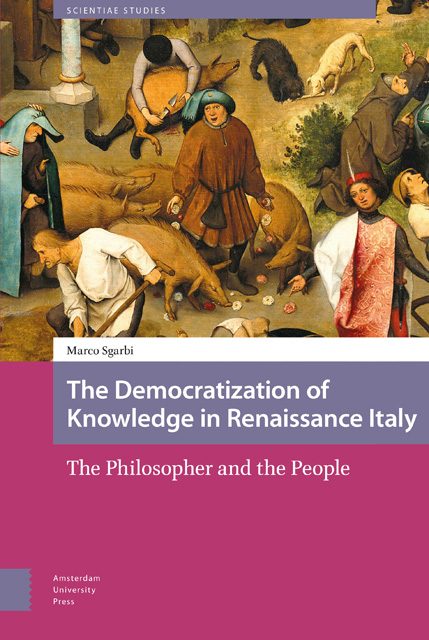5 - Tools of the Trade
Summary
Abstract
Chapter 5 focuses on the tools of the trade of the democratizers of knowledge – that is, their language and their techniques for vulgarization and popularization. The first part reconstructs how the vernacular became a “language of knowledge” capable of expressing philosophy and science. Starting with Pietro Bembo’s vernacular humanism, the chapter examines the theoretical solutions of Sperone Speroni, Alessandro Piccolomini, Giovan Battista Gelli and Benedetto Varchi. The second part highlights the polysemy of “vulgarization” as a form of “translation” or “popularization.” The third and fourth parts deal with the conceptual techniques of vulgarization, namely metaphrasis, paraphrasis, summary, explanation, and annotation in Lodovico Castelvetro, Sebastianus Faustus Longianus, Orazio Toscanella, Francesco Robortello and Girolamo Catena.
Keywords: Vulgarization, Popularization, Language, Translation
Language of Knowledge
To achieve the ambitious intentions and to realize the grand project of the democratization of knowledge, intellectuals were in need of a language capable of expressing even the most complex philosophical and scientific content, and also textual techniques that made it digestible for popular audience. Language and techniques are the democratizers’ tools of the trade. I have already pointed out that the democratization process was strictly related to language, and in particular to the diffusion of the vernacular. For more than a thousand years in Europe the main language for philosophy and science had been Latin. Latin in its various forms – albeit with regional and historical differences that cannot be smoothed away – constituted a relatively homogeneous background for European culture at least until the end of the nineteenth century. Around the twelfth century, vernacular languages appeared on the literary scene alongside Latin, yet – except in a few sporadic cases – the vernacular language was neither judged suitable for, nor commonly implemented in philosophy and sciences.
If the democratization of knowledge implies the adoption of the vernacular language – and I believe it so – it is important to understand how and why the vernacular became a “language of knowledge” in the period under consideration. By “language of knowledge,” I mean a language that is used to transmit different kinds of knowledge-seeking activities – such as philosophy or the sciences, or even sacred knowledge – and that is not restricted to any specific literary genre or area of interest.
Information
- Type
- Chapter
- Information
- The Democratization of Knowledge in Renaissance ItalyThe Philosopher and the People, pp. 119 - 160Publisher: Amsterdam University PressPrint publication year: 2022
